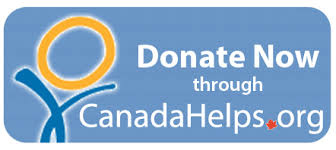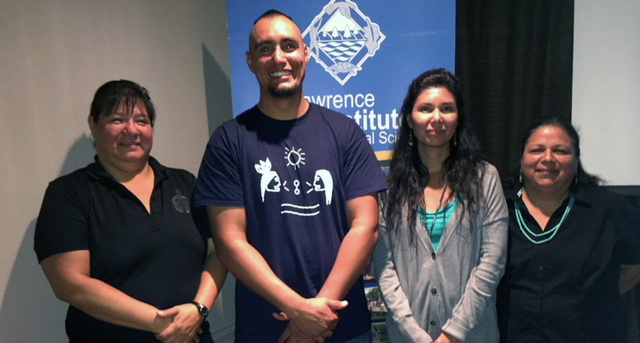
Blue Fish Canada was pleased to be able to take part in the World Wetlands Day celebrations in Akwesasne on February 2. Our volunteers distributed a range of fish health and water quality resources and our tips on sustainable fishing. We were part of a variety of interesting and diverse groups of exhibitors representing the scientific, conservation and youth engagement initiatives – all of which were well received by the Mohawk community and people from both sides of the Kaniatarowanenneh (St. Lawrence River).
The three Mohawk communities situated on the St. Lawrence have worked hard to protect and restore wetlands along the River. Heavy industrialisation during the first half of the 20th century and lax pollution control measures meant severe contamination of wetlands and the River that are still impacting the River to this day. Warnings and outright bans on consuming Walleye for health reasons remain in effect. Numerous areas of concern have yet to be addressed, but progress is being made.
In spite of remediation challenges, Efforts by the Mohawk Council to reconnect their youth to the River through fishing are underway. Youth and their families visiting our Blue Fish Canada exhibit Sunday demonstrates that these community initiatives are paying off, as made evident by the participation of the Mohawk nation in the Pan American Bass Fishing Tournament on the St. Lawrence River organized by Bob Izumi and the Canadian Sportfishing Association in 2019.
Blue Fish Canada volunteers and our president Lawrence Gunther were humbled when they met the many Mohawk youth, their families and elders, and heard the passion in their voices for the St. Lawrence River. It comes from the thousands of years the Mohawk have lived along the River’s banks. It’s a connection that has been undermined by the mess heavy industries from early in the previous century left behind. “We all love the River”, says Lawrence Gunther, “and feel the pain of not knowing if Walleye caught can be safely eaten, or if it’s one of the heavily contaminated fish that make up two of every ten fish according to research underway”.
No one can deny the St. Lawrence is still a beautiful part of earth, and one that deserves celebrating and our respect, such as through this World Wetlands event hosted by the Mohawk Community of Akwesasne. ”
Link here for a first-hand account of the Mohawk people’s fight to restore the St. Lawrence River and to strengthen their connection to the River on Blue Fish Radio first aired in 2017.
Link Here for Bob Izumi’s post tournament summary and his reflections of Mohawk nation participation in the 2019 Pan American Bass tournament aired on Blue Fish Radio.
Last week Blue Fish Canada reported on 2019 Program Highlights geared to recreational anglers seeking to enhance their stewardship and citizen science skills. Today we want to draw your attention to our recently published Report: Fish Health in the Great Lakes and Upper St. Lawrence River.
The goal of the Report is to promote fish health research, increase angler involvement, and inform policy and programs essential to ensuring the future of fish and fishing.
Water quality issues are numerous, but understanding how these issues impact fish health and the people and communities who have a vested interest in fish, are often over-looked. Blue Fish Canada will work to ensure the 17 recommendations contained within the Fish Health report are implemented. But, we can’t do it without you. It takes a community of anglers to ensure the future of fish health and the communities whose socio-economic sustainability depend on healthy fish stocks.
Although Blue Fish Canada programs rely 100% on volunteers, there are still costs associated with delivering important initiatives such as representing the concerns and views of recreational anglers and their communities. Over 17-million Canadians have tried fishing, support recreational fishing, and have plans to go fishing again. Help Blue Fish Canada raise the status of fish health to maintain this important connection with nature through the stewardship and sustainability of wild fish.
Healthy fish stocks and our connection to nature are intrinsically linked. A path forward to connect fish health stakeholders is clearly articulated in the Fish Health Report, but implementing the Report’s 17 recommendations takes resources. This is your chance to pay it forward so Blue Fish Canada can begin implementing the recommendations needed to build a Fish Health Network.
The Fish Health Report represents the views of scientists, fishers, government, conservationists and business. While the focus of the Report is the Great Lakes Basin and Upper St. Lawrence River, the Report’s methodology sets out a framework that will be replicated as we engage stakeholders across Canada.
The time to dream and plan is now over. The path forward is well defined and includes broad stakeholder engagement. It’s time to take action and begin implementing the recommendations of the Fish Health Report.
Please lend your support by getting involved or by making a tax deductible donation as we launch this next phase of stakeholder engagement with the goal of ensuring fish health and the future of fishing. Don’t forget to sign up for our Blue Fish News Letter.
Lawrence Gunther Euteneier M.E.S. M.S.M.
President / Blue Fish Canada
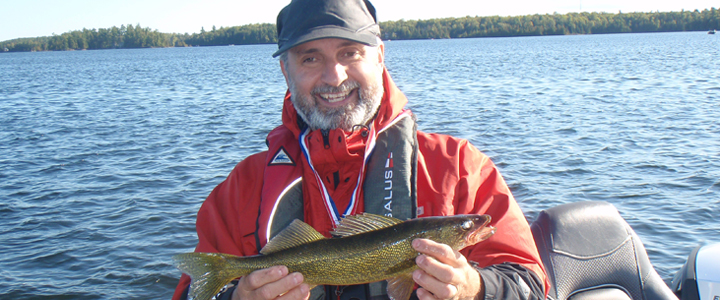
Word from the President: As the Founder and president of Blue Fish Canada, and Canada’s only blind outdoor writer, podcaster, TV host and film maker, I’m continuously engaging with stakeholders to track and promote Canada’s water quality, fish health and recreational fishing. This includes partnering with local and national fishing and conservation organizations, experts and centres of expertise, and anglers engaged in citizen science. At the same time, Blue Fish volunteers are busy implementing programs and reporting back on successes and lessons learned. Here’s a summary of what we accomplished this year.
Sustainable Fishing Tips cover harvesting recommendations and catch-and-release best practices:
- Fact-checked by leading Blue Fish Science Advisors;
- Adopted by fishing and conservation groups across Canada;
- Regionally customized to include fish ID information and relevant fish handling best practices.
Blue Fish Sustainable engages partner organizations and recognizes their commitment:
- Partners feature and distribute Blue Fish Tips;
- Sustainable harvesting recommendations and catch-and-release best practices become partner policies;
- Public recognition and endorsement of partners for their stewardship commitments;
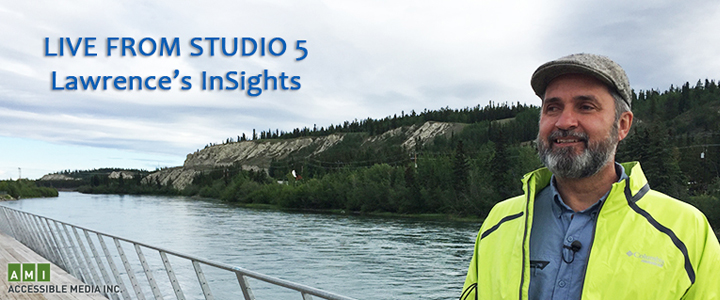
TV extends the reach of Blue Fish to mainstream audiences:
- Semi-weekly 12-minute outdoor environmental stories on “Live from Studio 5”;
- Monthly 5-minute outdoor conservation segments aired on “AMI This Week”;
- Streamed on the Web and aired on basic cable and satellite TV across Canada;
Stewardship Kits available to anglers and partner members at cost:
- Includes catch-and-release sustainable fishing tackle;
- Fish ID cards and regionally relevant tips inform new anglers on best practices;
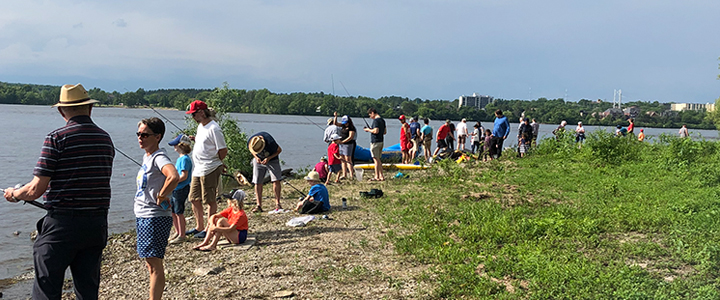
Youth and Family Fishing events inform and inspire the next generation of conservation minded anglers:
- Sponsored two family ice fishing derbies and one shore fishing event on Family Fishing Weekends;
- Provided families with shoreline clean-up kits, EagleClaw circle hooks, tin weights and floats, fish ID cards and tips for handling fish;
- Events included the Harbour Harvest Ice Fishing Derby, the Ottawa Family Fishing Ice Derby, and the Remic Rapids Family Fishing Day;
Outdoor Magazine Publications include information about Blue Fish programs and stewardship strategies:
- Seven articles published in magazines such as Outdoor Canada, Muskie Release Journal, North-East Ontario Tourism, etc.
- Topics included anglers as citizen scientists, Muskie catch-and-release best practices and reporting on fish kills;
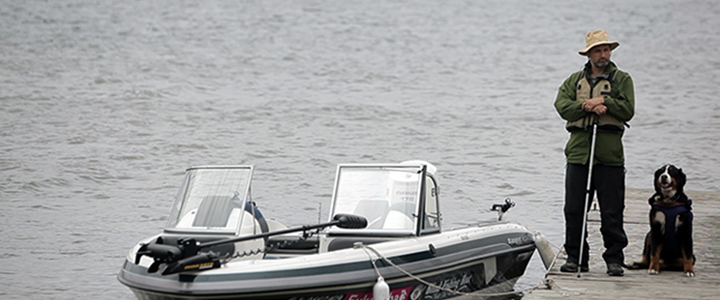
What Lies Below feature film introduces viewers to water quality and fish health issues across Canada:
- Ten water quality / Fish health stories told by anglers and fishers from across Canada;
- 79-minute Feature documentary airs on CBC television;
- In April 2020 will begin airing on YouTube;
- Funds raised through screenings go to Blue Fish Canada;
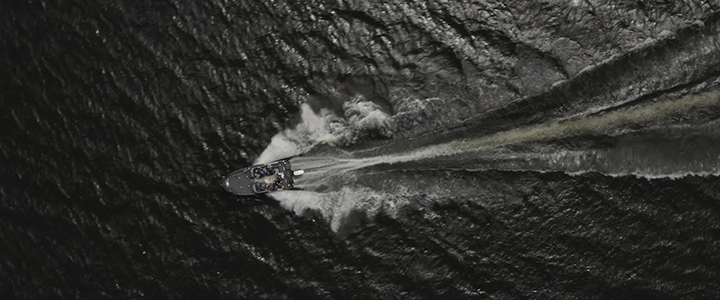
Blue Fish Tips for integration with 3rd-party audio content:
- 52 1-minute audio stewardship tips available for listening and downloading;
- Leading fishing podcast producers include Tips as PSA’s.
Feel the Bite Videos explain why we all need to be stewards:
- 12 viewable and downloadable 5minute video stewardship tips;
- Used by schools, outdoor shows and 3rd-party websites;
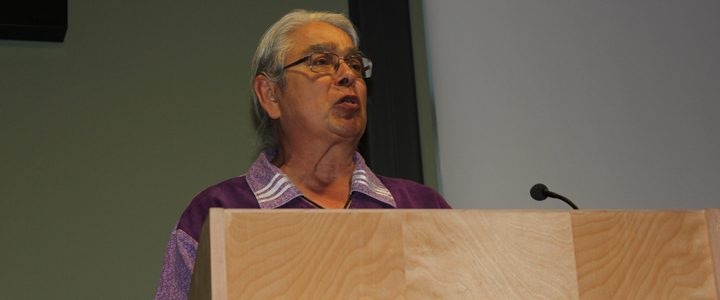
Urban Fishing Nodes create fishing access and fish habitat:
- Working with city officials and Indigenous leaders to build fishing access into shoreline development projects;
- Provides urban youth with low-cost outdoor experiences;
- venues for Blue Fish volunteers to mentor new recreational anglers;
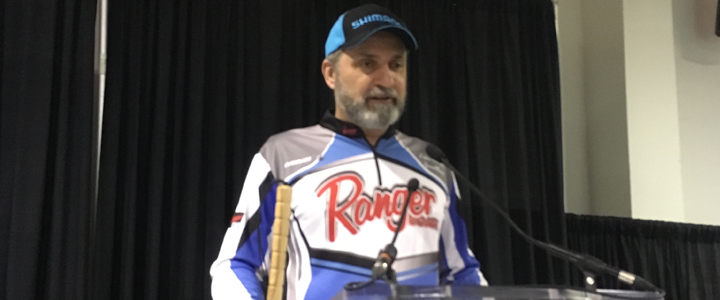
Sustainable Fishing Seminars showcase Canada’s diverse and rich natural abundance and the stewardship roles anglers’ play:
- 17 seminars ranging from 30 to 60 minutes;
- Venues included: Ottawa Boat Show’s CSFL Super Tank, Toronto Sportsman Show’s Outdoor Seminar Stage, high schools and fishing / conservation clubs;
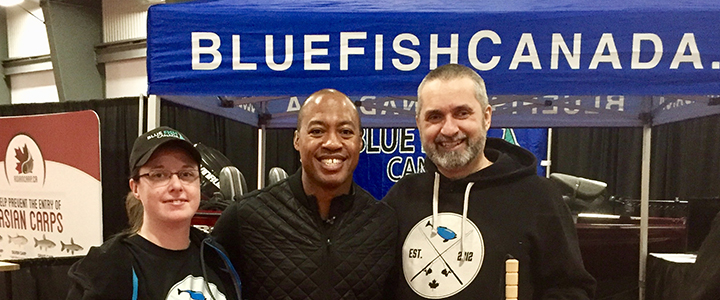
Mainstream Media coverage:
- Twice featured on Outdoor Journal Radio;
- Featured on podcasts including Tom Rowland, Ugly Pike and Fish Nerds;
- 4-minutes on CTV Morning news;
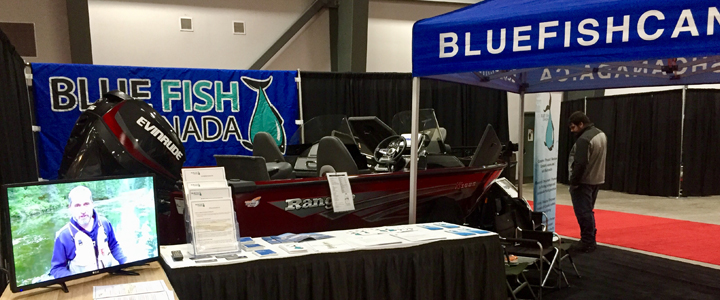
Outdoor Shows allow anglers to learn about Blue Fish programs and to provide feedback:
- Exhibited ten days at the Ottawa Boat Show, the Toronto Sportsman Show, and the Musky Odyssey;
- Distributed free shoreline clean-up kits, fish ID cards and stewardship tips;
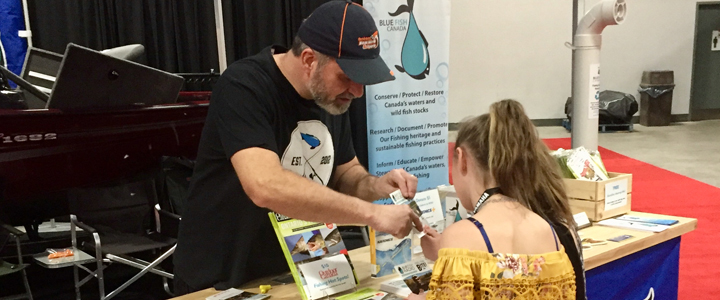
Social Media:
- Over 150 original Posts shared with groups and influencers across Canada;
- Twitter and Facebook accounts include:
TW/@BlueFishnews
FB/BlueFishCanada
Conferences and Webinars provide venues to promote water quality, fish health and recreational fishing:
- Participated in 11 conferences, symposiums, stakeholder consultations, annual meetings and webinars;
- Representing angler issues over fish health and concerns regarding access;
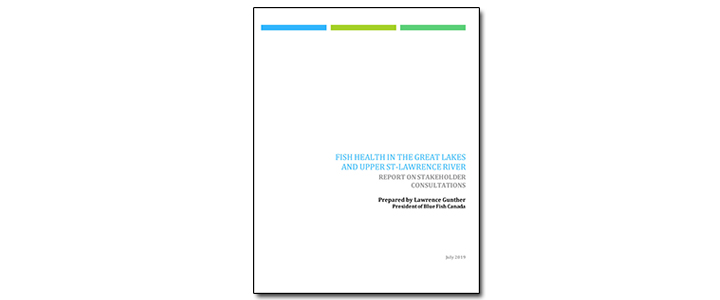
Fish Health consultations and report directly links fish health concerns to issues such as water quality:
- Authored the consultation report “Fish Health in the Great Lakes Basin and Upper St. Lawrence River”;
- Stakeholders included recreational anglers, indigenous fishers, scientists, recreational fishing industry, and government;
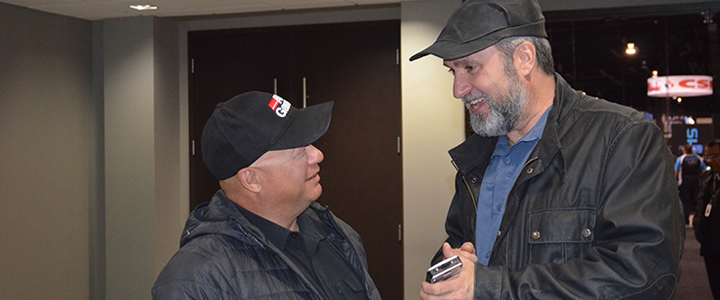
Blue Fish Radio sponsorship of the podcast continues:
- 52 new Blue Fish Radio episodes aired by 18 podcast broadcasters;
- Reflections and advice on conservation by “giants” of the Canadian fishing industry (Bob Izumi, J.P. DeRose, Dave Mercer, Peter Bowman, Angelo Viola, Jeff Gustafson, and more);
- Expert guests covered everything from the Striped Bass / Atlantic Salmon controversy on Canada’s east coast, to the struggling salmon populations on the west, and everything in between including Walleye on Lake Winnipeg and fish kills on the Ottawa River;
- The podcast now ranks in top-30 fishing podcasts by Feedspot, and is the official podcast of Outdoor Canada Magazine;
Summary: Blue Fish Canada continues to serve an increasingly important role in the future of fish and recreational fishing across Canada thanks to dedicated volunteers and the funds provided by donors and foundations. Please think of Blue fish Canada the next time you want to show how much you love the tremendous fisheries Canada has to offer.
Thank you!
Lawrence Gunther
President
Blue Fish Canada
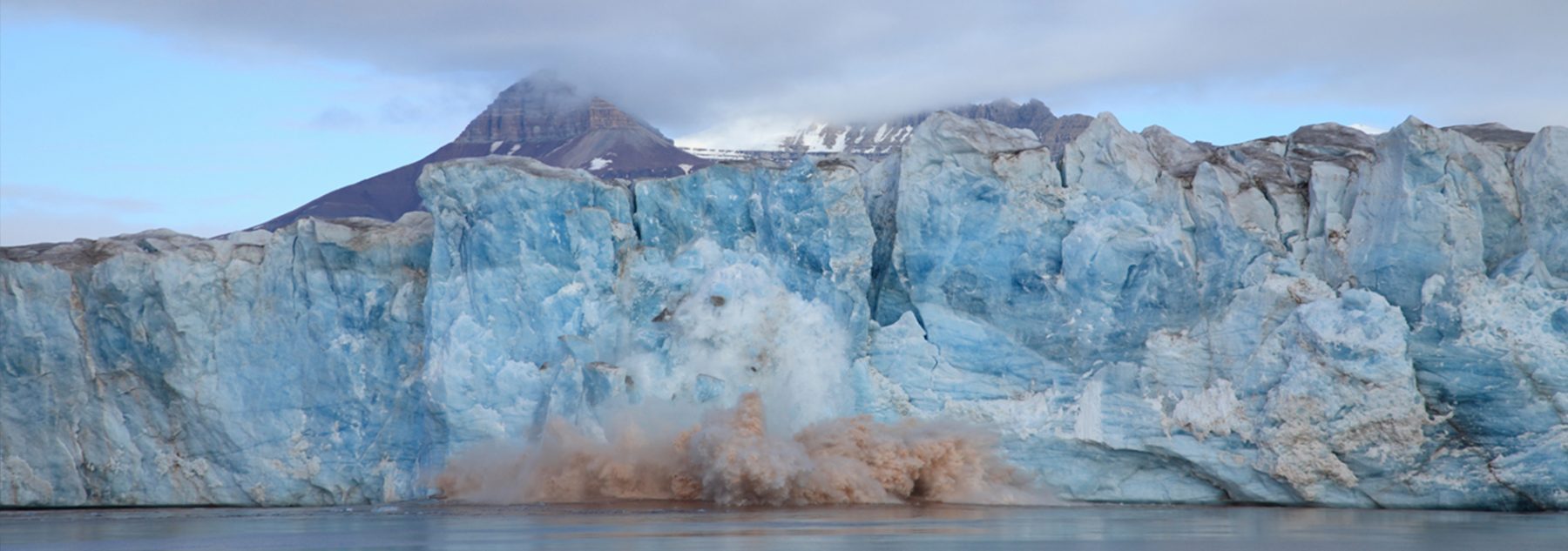
Tired of hearing about climate change and how it’s going to destroy the world as we know it? Well, try doing some of the following and let’s put a halt to climate change and all that bad news. These New Year’s resolutions have nothing to do with losing weight, and everything to do with the health and wellbeing of us all. The following are 12 actions experts recommend each of us can do to prevent further climate change:
- Measure Up: There’s some truth to the saying “What gets measured gets managed,” and quantification has become something of a cultural obsession. Oroeco, an app available on both Android and iOS, takes that zeal and applies it to tracking personal carbon emissions. Oroeco helps quantify the carbon emissions associated with purchases, investments, dietary choices and preferred modes of transport. It allows users to set goals, track performance and even compare their performance with friends.
- Reduce Consumption: Reuse everything possible, fix and repair items, recycle those items that can’t be used again.
- Conduct an Energy Efficiency Audit and develop an improvement plan: Weatherizing, using energy efficient appliances and light bulbs, and unplugging devices top the list for reducing your energy usage.
- Consider Solar: Take advantage of government programs or join a Solar Power Club to add the power of solar energy to your home or business. Whether it’s a solar heater to complement your regular water tank, or a solar panel to generate electricity, or simply using passive solar energy to heat your home, it will all help to reduce our consumption of fossil fuels.
- Switch Diets: By switching to a diet full of nuts, beans, fish and less meat, global warming could be reduced by up to 15 percent by 2050. By eating fish instead of steak, you’ll produce an eight-fold reduction in emissions, and switching to beans or lentils drops your footprint to almost zero.
- Waste Not: Worldwide, agriculture accounts for 18 percent of greenhouse gas emissions. We can help slash emissions by simply wasting less food. According to the Food and Agriculture Organization of the United Nations, about a third of the food produced worldwide never gets eaten. North American consumers and restaurants are some of the worst — throwing away almost 40 percent of the food they purchase.
- Compost: Whether you have a backyard bin, vermiculture (worm) bin, or utilize curbside pickup, composting benefits the environment. Food scraps and yard waste are typically about 30% of the waste going to landfills and incinerators. There is a two-fold climate benefit to composting by reducing the amount of methane gas released into the atmosphere.
- Install a Rain Garden: Climate change means more dramatic weather events, including flooding. Rain gardens are beautiful additions to any size yard and will relieve burdens on municipal water treatment systems, filter runoff pollutants, and protect local waterways.
- Plant a Tree: All residential communities should adopt the goal of 60% tree cover. Trees will clean the air, capture carbon and provide habitat and food for native wildlife.
- Use Transit: The transportation sector contributes over 1/3 of our carbon emissions. Use alternative transportation, such as biking, walking, taking the bus, and carpooling. Or, go electric. By committing to walk or bicycle distances under 1 km, about roughly 20% of car trips, you will eliminate 611 grams of carbon dioxide per kilometer. That’s the equivalent of the weight of a football or a can of soup.
- Step it up: Talk to people about the unraveling Arctic, extreme weather, rising temperatures and oceans, and all the rest that adds up to climate change. Challenge people who still think it’s nothing more than another of nature’s phases, but be respectful when presenting the facts.
- Get Civically Involved: Find and join a local climate change or conservation group. Phone and email your government representatives. Ask questions of store managers when making purchases.
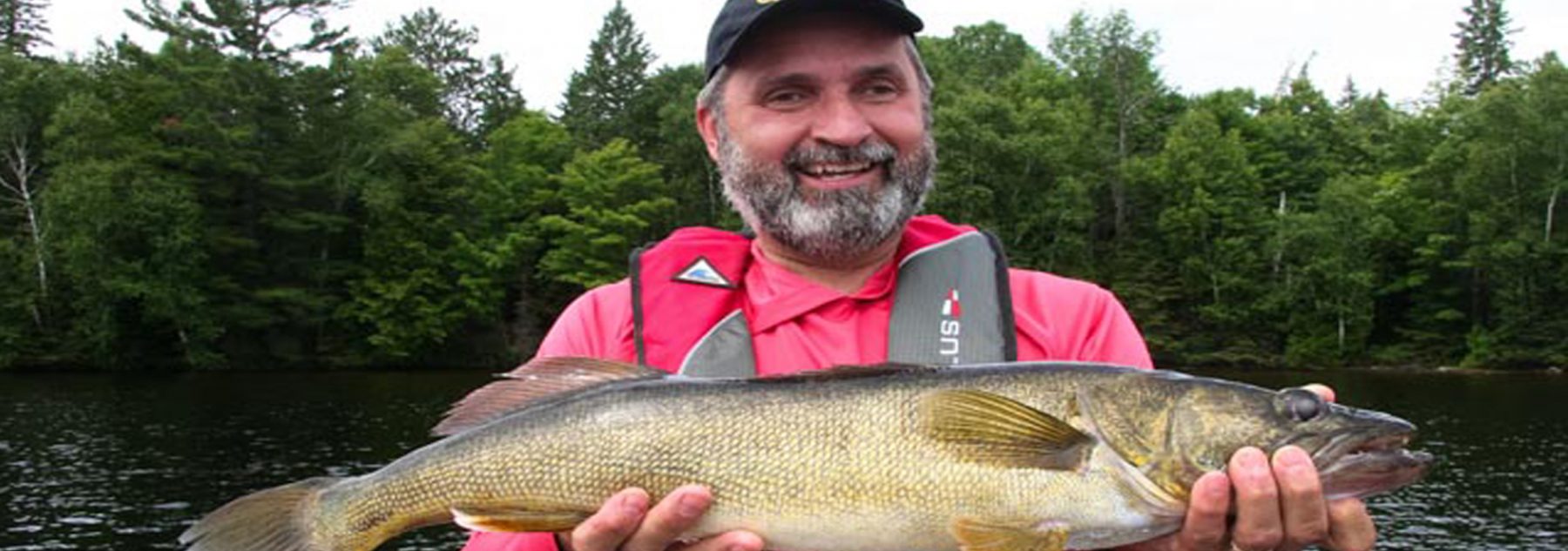
November 2018
Without doubt, 2018 has been a building year for Blue Fish Canada. Thanks to your donations and a series of grants, we pushed well past the $10,000 mark for the first-time revenues since incorporating as a non-profit and registering as a national charity. A 100% reliance on volunteers means all fund projects including Urban Fishing Nodes, Fishing Tackle Recyclers, Fish Stewardship and Citizen Science, Shoreline Clean-Up, and Fish health. Blue Fish Canada 2018 highlights follow:
Outreach: With support from the Canadian National Sportsman Show Services, Master Promotions Ltd. and Cabela’s, BFC volunteers were able to stage strong exhibits over 13 days at five events, including a 20’X40’ Kids Casting Zone featured on CTV morning news:
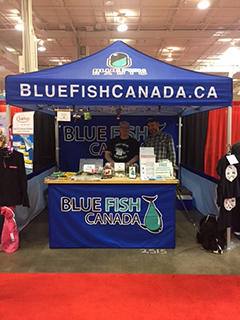
Blue Fish Canada’s new show canopy
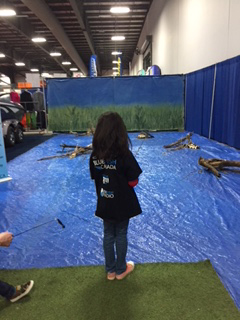
Blue Fish Kid’s Casting Zone
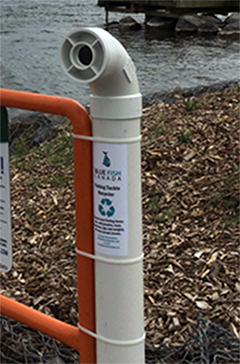
Blue Fish Canada Fishing Tackle Recycler
Partners in Conservation: Blue Fish Canada established partnerships with a number of fishing tournament organizations, such as the Ontario B.A.S.S. Nation and B1 Fishing, to promote conservation and fish stewardship. Partner members are provided with science-based guidelines on sustainable tournament fishing and a Shoreline Clean-Up Kit. A Fishing Tackle Recycler is provided to each organization to collect expired fishing gear.
Fishing Tackle Recyclers: BFC volunteers installed 18 “Fishing Tackle Recyclers” at boat launches and popular shore fishing locations throughout eastern Ontario. The collection stations were welcomed by Local municipal officials. The Recyclers collect lead jigs and weights, old fishing line and soft plastic baits, hooks and even plastic straws.
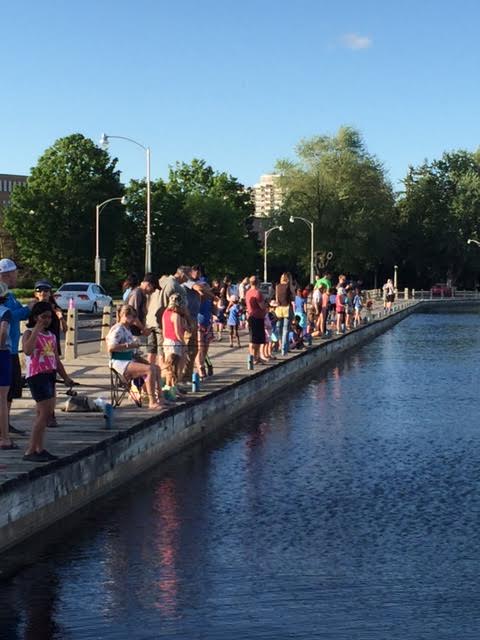
Girl Guides fishing downtown Ottawa
Urban Fishing Nodes: With support from the Ottawa Community Foundation, BFC is working with Ottawa’s city and National Capital planning officials and stakeholders to establish urban fishing nodes. The nodes will provide urban youth with safe and accessible naturalized spaces to fish along the Rideau and Ottawa rivers. Natural features will also extend into the water to provide fish habitat. Drawing on lessons learned from this project, a guide will be produced to inform and inspire other Canadian cities to create their own fishing nodes.
Fish Stewardship and Citizen Science: Thanks to a grant from Scotia Trust, the look-and-feel of our educational materials are inspiring and informing even more youth and those new to fishing. Modules include catch & release, selective harvesting, citizen science, invasive species prevention, fishing tournament best practices, fish identification, and training and certification.
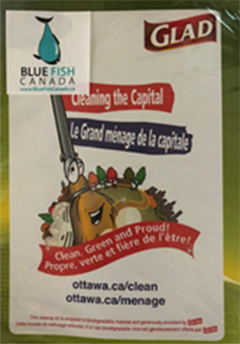
Blue Fish Canada Cleanup kit
Shoreline Clean-Up: Blue Fish Canada distributes over 3,000 free shoreline clean-up kits each year to youth and anglers of all ages. Each kit comes in a biodegradable wrapper and includes protective gloves and a waste collection bag.
Fish Health: BFC’s partnerships with fish health researchers facilitate the engagement of anglers interested in supporting fish health research, conducting citizen science and sharing local knowledge. BFC continues to be on the look-out for a suitable smartphone app.
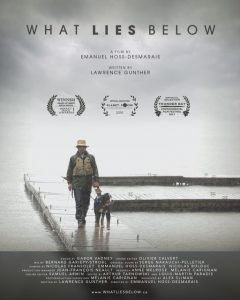
Poster of the feature documentary ‘What Lies Below’
MEDIA
What Lies Below: 79-minute feature documentary showcasing fish conservation now airing on CBC and AMI television;
Blue Fish Radio: 25-minute podcasts broadcast and downloaded weekly to over 100,000 listeners;
Lawrence’s Insights: bi-weekly 15-minute TV broadcast across Canada over basic cable and the internet.
Social Media: @BlueFishnews Tweets and the Blue Fish Canada Facebook page are up-dated weekly;
Outdoor Canada: promotes/ publishes Blue Fish Radio episodes and articles; and,
Lake2Plate: videos that generate ever-stronger interest in sustainable fish harvesting
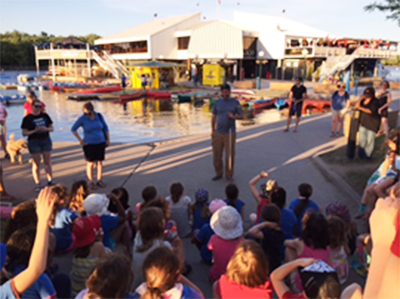
President Lawrence Gunther conducting a post-fishing, Q/A session with 55 Ottawa-area Girl Guides
Leadership: As the Founder and president of BFC, and Canada’s only blind outdoor writer, podcaster, TV host and film maker, I’m continuously monitoring science and local news, and engaging with relevant stakeholders, to track and promote Canada’s water quality, fish health and recreational fishing. This includes attending and presenting at scientific conferences, and National Oceanic and Atmospheric Administration certification through their Marine Recreation Education Program – the first Canadian to be certified.
Conclusion: Blue Fish Canada is strengthening and expanding programs to ensure youth and anglers of all ages have the skills and motivation to advocate for sustainable fishing and watershed conservation. It’s essential given the rapid change marine and aquatic ecosystems are experiencing and underscores the need to work hand-in-hand with research and angling communities to develop and implement sound fish stock and watershed management programs and policies. Action now is crucial to ensure the future of Canada’s water quality, fish health and the future of recreational fishing.
Support: Please support Blue Fish Canada to inspire and inform the next generation of conservation-minded outdoor enthusiasts by making a tax-deductible donation by visiting: https://bluefishcanada.ca/donations/
Yours truly
Lawrence Gunther Euteneier B.A. MES
President / Blue Fish Canada
Facebook: www.facebook.com/BlueFishCanada/
Twitter: @BlueFishnews
Web: BlueFishCanada.ca
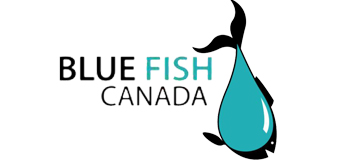 Blue Fish Canada/Poisson Bleu Canada
Blue Fish Canada/Poisson Bleu Canada